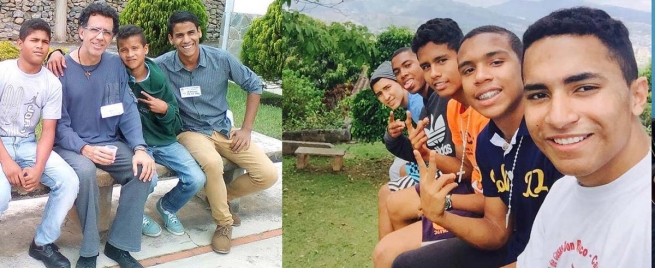VENEZUELA: Salesian missionaries continue programs for poor and homeless youth despite instability in the country

(MissionNewswire) Venezuela is facing an increase in corruption, prices and a scarcity of goods. As a result, the country is dealing with insecurity and violence. CNN Money released an article that noted Venezuela has lost half of its economy since 2013. According to the article, new figures published by the International Monetary Fund indicate that unemployment will reach 30 percent and prices on all types of goods in the country will rise 13,000 percent this year.
The CNN article notes that Venezuela is deep into an economic, political and humanitarian crisis, largely inflicted by the government’s own policies. Food and medical shortages are widespread and people have been scavenging for food in dumpsters. CNN notes that the country’s citizens are fleeing by the thousands. Venezuela’s currency, the bolivar, is nearly worthless.
Even in these challenging times, Salesian missionaries continue to take care of children living on the streets and to recover those who belong to criminal gangs. Both Red de Casas Don Bosco and the Patio Abierto Don Bosco aim to improve the lives of street children by connecting them with shelter, meeting their basic needs and education. For many, living on the street and trying to make a meager living to eat has become a way of life. Some want access to programming while others want to remain, but Salesian missionaries work to provide the services they can and meet youth where they are in life.
Red de Casas Don Bosco offers shelter to more than 1,300 street children across the country, thanks to 10 Salesian houses. Leonardo Rodríguez, a lawyer and president of Red de Casas Don Bosco, is concerned about the country’s instability. He says, “Every day adults come in search of their children who have fled their homes and other parents ask us to welcome their children in one of the Don Bosco houses because they have no way to feed their children.”
“For almost a year, we have asked the National Council for the Rights of Children and Adolescents to draw up a national plan for the protection of the rights of children at risk, given that it does not exist,” adds Rodríguez.
In more than 20 years working with the Salesian program, Rodríguez, has also met minors who had been criminal gang members. He says, “The hardest thing is when you make every effort to bring these kids together and maybe in less than a year they end up killed or in jail.”
Since 2013, Salesian missionaries have started new initiatives in the poorest neighborhoods to prevent children and adolescents from joining criminal groups. Among these cases, there is one of two brothers, aged 11 and 13 that Rodríguez will never forget.
“They were taken in by an uncle after having received from our institution for two years, but the result was sad and terrifying,” says Rodríguez. “The youngest child was killed in a gang battle and the older boy was hit in the head and became deaf. It was pitiful to see him that way, but he continued to come to the Don Bosco house until the following year, when the gang found him and killed him.”
Salesian missionaries continue their work in the country despite volatile conditions. They aim to provide education, workforce development and social development services to poor youth and their families.
###
Sources:
ANS – Venezuela – Street children and criminal gangs: Salesians in their midst
CNN – Half the Venezuelan economy has disappeared
Any goods, services, or funds provided by Salesian Missions to programs located in this country were administered in compliance with applicable laws and regulations, including sanctions administered by the U.S. Department of Treasury’s Office of Foreign Asset Control.




